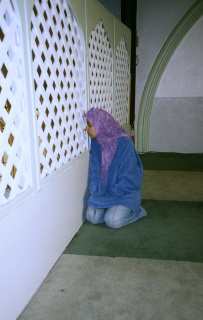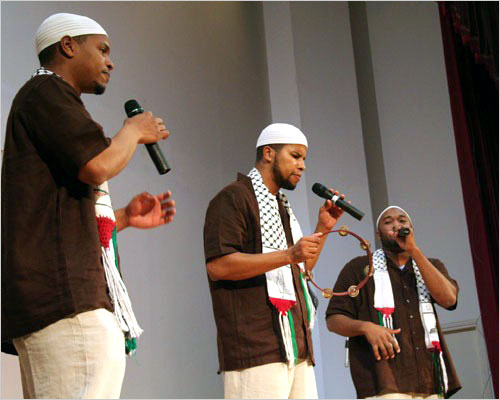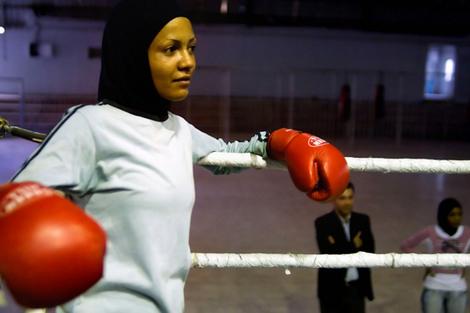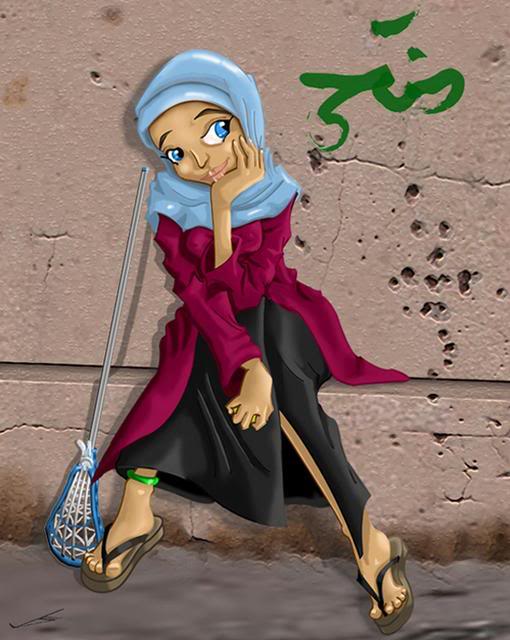Suhaib Webb is a contemporary American-Muslim educator, activist, and lecturer. His work bridges classical and contemporary Islamic thought, addressing issues of cultural, social and political relevance to Muslims in the West. After converting to Islam in 1992, Webb left his career in the music industry to pursue his passion in education. He earned a Bachelor’s in Education from the University of Central Oklahoma and received intensive private training in the Islamic Sciences under a renowned Muslim Scholar of Senegalese descent. Webb was hired as the Imam at the Islamic Society of Greater Oklahoma City, where he gave khutbas (sermons), taught religious classes, and provided counselling to families and young people; he also served as an Imam and resident scholar in communities across the U.S.
From 2004-2010, Suhaib Webb studied at the world’s preeminent Islamic institution of learning, Al-Azhar University, in the College of Shari`ah. During this time, after several years of studying the Arabic Language and the Islamic legal tradition, he also served as the head of the English Translation Department at Dar al-Ifta al-Misriyyah.
Outside of his studies at Al-Azhar, Suhaib Webb completed the memorization of the Quran in the city of Makkah, Saudi Arabia. He has been granted numerous traditional teaching licenses (ijazat), adhering to centuries-old Islamic scholarly practice of ensuring the highest standards of scholarship. Webb was named one of the 500 Most Influential Muslims in the World by the Royal Islamic Strategic Studies Center in 2010.







![Cultural Transport [C Precvious Picture]](https://www.virtualmosque.com/wp-content/uploads/public-enemy-flava-flav-chuck-d.jpg)






Salaam
Haha… I enjoyed that
What in the….world…
lol
Imam Suhaib?
“Brother! I want to Know about the meat outside?” “Its cold Auntie!”
I don’t get that one, but the rest of them are quite funny. Jazak’Allah Imam Webb!
Haha the pious sister one is by far the best!
McCain’s one is good too lol.
He didn’t even give salams to Aisha, when he divorced her! What is this “Dear Aisha”!!?
Imam Suhaib got mad jokes!
Salaams!
Haha these are pretty funny!
Shish Tawuu for lunchhh lol.
lol the cell phone one is awful if its true
Asalamu alaykum,
This was meant to be serious post and there is, in some strange way, a symmetry. The first picture moved me and I hope we can think deeply about what it means to sit on the other side.
SDW
Assalamu alaykum:
The first picture is a sad commentary on the current status of women in our masajid.
But from the other side..coming from a masjid where there is very little barrier and we can see and hear each other…we sisters act like we are just DYING to be sent home. We talk, whisper and so on during lectures, we even have to be ‘shushed’ to start the prayer, and we let our kids run wild. Now, the latter is also on the brothers, because they can see their kids too running around pulling down drapes and act like it’s somebody else’s kid.
On some of the others…well, a brother that runs a local restaurant was stunned to hear “I don’t care if the chicken is halal or not,” and the customer’s daughter wears niqaab. Rightly or wrongly, he saw some cognitive dissonance there.
Recently, at a community meeting with a local politician, one Muslim asked the politico, “You should control the media so that they paint a better picture of Muslims.” Excuse me? Isn’t that partly why you are here? Because the government doesn’t control expression, including the hijab on her head. We want freedom to practice our deen but want to impose our own ‘back home’ mentality. Or how about Muslims act rightly so that the media doesn’t even get a chance? What about tooting our own horn via press releases when we do something right, and not just when some ‘other Muslim’ does something wrong?
Last, that ‘cool’ brother is scary…give me an ugly, pious, poor one, any day of the week…
Assalaam alaykum
wa alaykum as salam warahmatuAllahi wa baraktuhu,
it might be funny, but it’s also hecka scary. it’s actually hecka, hecka scary. this is how so many people really see us…including our own people man…
look at the sister trying to get a glimpse of the knowledge, behind bars and with no access to the person who has knowledge. yeah it’s harsh to make it sound like a prison, but it’s our reality.
we need to step up and start reaching out, and we need to start doing so in our own communities.
mashaAllah some of the pics were changed from this morning, walhamdulillah.
On a serious note, is there something wrong to sit with a barrier/curtain etc for sisters? Of course having access to the teacher/shaykh is different, but on a personal level such as taking notes for a class, for the khutbah and things, I prefer to sit and listen behind a barrier/curtain/separate area. Maybe it’s just me because I don’t see anything wrong with it…? I don’t mean to be offensive at all, i’m just curious. Allahu ta’ala a’lam.
okhti Amatullah,
naw man, I know there are a ton of sisters who are more than down with that…That reflection was a culmunation of frustration with barring sisters from gaining knowledge through subtle, probably “precautionary” efforts [maybe sadd ad dhariee3 in effect?], often unintentional, but which leaves a serious effect on the mentality of [some] women, particularly those brought up in the west.
I recently asked a Shaykh if he would teach a group of 10 girls and, barik Allahu fee, hafidhaullah, he said he would only teach men and kids and the women could go to a woman [and he did give me a fitna-related reason, although he did it in the most utmost respectful, sincere way. And also, this is a thing that has to do with the culture of the country I’m currently in; it’s against the norm for a man to teach women in a private dars like that]. only problem: if there were women on that level, i wouldn’t have needed to ask him if he could teach us. And the problem that I’m facing, and a lot of sisters I know are facing, is that the ‘women are fitna’ mentality are barring sisters from moving forward with regards to scholarship.
The Prophet sal Allahu alayhi wa sallama had a special day for women, the women in his masjid, sal Allahu alayhi wa sallama, were able to witness the khutbah without barriers [with all other adaab, etc taken account for]. Maybe the barrier thing is not an issue for some, but for others it really does take away from feeling like you have access to knowledge.
And I guess one of the major things for me is that if a woman has a question, and she is in another room, or behind something when there is a lecture happening, there are great lengths taken to get that question to the other side. If there are no kids to fedex it to the speaker, it’s often a great burden just to get a question answered, and most women do not approach the speaker after the lecture [for sooo many reasons; from the fact that all the brothers are surrounding the speaker, and continue to surround the speaker for quite some time after the lecture, to the fact that she’s got kids who’ve been trying to leave since the lecture started, to the fact that it’s late and she needs to get home…etc]. I never felt when learning from the seerah that the Companions were this way with the knowledge. Look at how our female scholarship swelled! Where are we today? The sabab is not whether or not there is a barrier. It’s an entire mentality and culture which is in, out and all around it. wa Allahu ‘alam
And I think this has a lot to do with personal preference, like the post Br.Abdul Rahman wrote a while back…there’s a ton of comments on what sisters and brothers think about the situation, and I wasn’t trying to open a can of worms in this post. So my apologies…. good time to just leave it as personal preference maybe, and just make dua for us all to return to the sunnah of the Prophet sal Allahu alayhi wa sallama, and reflect on the pictures to see how we can work on practicing Islam like the Qur’an and Sunnah present it, with the great freedom of thought we’re given yet often rarely, as a community, practice.
Barik Allahu feeki for your clarification question! and May Allah continue to open the doors of arabic for you and make you a means of helping millions come back to the language of the Qur’an, seeking to know the Qur’an. AMEEN
keep us in your dua’, arjooki!
maryam
Salam Shiekh,
Could you please explain the point you are making for each picture? Some I get, some I don’t.
Salaam Hamayoun
a word of advice; ponder over it
Jazaki Allahu khayran ukhtee Maryam for your kind words and clarification 🙂 I was worried my question may have come off as a bit rude. Alhamdulillah.
Ameen and may Allah azza wa jal grant you success in this life and the next, Ameen. wa feeki barak Allah!
I completely understand the pictures now; I should have done some tafakkur 🙂 Barak Allahu feeki.
SubhanAllah ukhtee, I JUST experienced that last night–where the brothers crowd around the teacher, leaving us with our questions waiting for such a long period of time. SubhanAllah I was hoping the teacher would let us go first; since it was late at night and we had some older sisters (one on a cane) waiting to ask or speak to him but that did happen, wa lillahil hamd.
I was thinking of sending an email to teacher to let him know because I don’t think he is aware of this, because some sisters have to drive home by themselves at that late time, some have crying children like you said, others have people waiting for them…It’s just a lot harder for the sisters and inshaAllah it’s just courtesy because the brothers have all the time to interact with the teacher, and Allah knows best.
I have definitely experienced the “women are a fitnah” mentality (here and abroad); not just with learning/scholarship but just with everyday matters (like going to the masjid, an event or eating out).
I know Saudi is not the greatest example, but while I was there we had some halaqaat with the shuyookh (may Allah preserve them, Ameen) and some of the brothers attending didn’t want the sisters there but alhamdulillah the shuyookh didn’t say a thing; they just requested us to sit in the back behind a wall divider and some just said to sit behind the brothers only.
Even at some of the museums and islamic centers, women were not allowed to participate. It didn’t bother me much but many of my friends were very upset. For example, the Qur’an Printing complex in Madinah did not allow the sisters to visit (literally they said: no women allowed) and then there was a special tour planned of masjid an Nabawi (all the areas hidden to the public, the library etc) for the brothers and they didn’t allow the sisters to come. Allahul Musta’aan.
Another example of this mentality are sisters, who are mashaAllah covered to the full extent that is prescribed by the Qur’an and Sunnah, are blamed for being a fitnah…I don’t understand?! I know masajid that have sent out notices to all the sisters saying that they cannot wear colored hijaabs because it’s a “fitnah”. 😐
If we are really being blamed for being a ‘fitnah’, while we are covered as our Rabb prescribed, then that has to be the weakest excuse I’ve ever heard.
Allah ta’ala says in suratul Israa ayah 36:
إِنَّ السَّمْعَ وَالْبَصَرَ وَالْفُؤَادَ كُلُّ أُولَـٰئِكَ كَانَ عَنْهُ مَسْئُولًا
Indeed, the hearing, the sight and the heart – all those will be questioned.
The word used for ‘heart’ in the ayah is ‘fuaad’. There is another word for heart in Arabic, which we all know is ‘qalb’. Allah azza wa jal did not say our quloob will be questioned, but He ta’ala said the fu’aad. What is the difference? A fu’aad comes from the root which means to burn or burning; so a fu’aad is a heart that is flaming with emotion—be it anger, lust, frustration…Basically the heart that is ‘in the heat of the moment’.
When we are questioned on the Day of Judgment, we cannot say “they were a fitnah!” to Allah ta’ala because we are the ones in control of our fu’aad and we cannot use the “I was emotional!” or “it was out of anger!” excuse on that Day…It’s not going to work. WE will be accountable for what our hands, eyes and hearing reap—no one else. Allahu ta’ala a’lam.
wa alaykum salaam
There is absolutely nothing wrong with barriers and I’m cool with either way. There IS a problem when we are shoved into rooms that have no cooling, heating, no sound system and no access to the lecturer.
And Allah knows best…..
Salaam
salaam,
I do not like barriers for the following reasons:
1) It disrespects women. It treats them as seductresses that need to be hidden instead of human beings that wear hijab to protect themselves from molestation.
2) It nurtures in men a lack of self control, so instead of men learning to control themselves they learn to closet women.
3) It inhibits learning amongst women. Women behind barriers feel like they do not belong so they talk and socialize instead of listen.
4) It nurtures in men to look down at women, since women are not part of the program – why consult them. Most questions that make it above the barrier – are shoved aside or mocked by the moderator or speaker.
5) It teaches men to mistreat women, since women are out of sight and out of mind in the masjid, then men take that understanding to their home. Hence the wife is also not consulted or communicated with. And brothers will call brothers to socialize since they do not know how to communicate with their spouses and feel easily bored.
6) Women do not look to Islam, so mothers are often difficient in knowledge and the next generation follows suit since they are mainly raised by sisters.
7) It shuts down opportunities for growth. So instead of brothers and sisters learning how to communicate in the masjid with each other around Muslims and elders, they are taught to avoid each other and have dual personalities. In the Masjid it is mr. and mrs. piety, but outside we see mr. and mrs piety do acts or engage with the opposite sex in unislamic ways.
8) It encourages abuse of women. Mr. piety is visible to the imam and when marital counseling takes place, the Imam is biased toward Mr. piety since he has a very strong relationship with him from the masjid and never saw his wife.
9) Children raised here do not have a large extended family to learn how to interact with sisters/brothers – so they learn to avoid Muslim sisters and sisters learn to avoid brothers, but will form flirtatious relationships in schools with nonMuslims of the opposite sex.
etc.,
Please read:
Where are the women part 1
http://www.jeewanc.com/index.php?option=com_content&task=view&id=68&Itemid=57
and
Where are the women part 2
http://www.jeewanc.com/index.php?option=com_content&task=view&id=69&Itemid=57
wasalaam,
Fedwa
wa alaykum assalam Fedwa
I think those are very grave generalizations and I strongly disagree. Can you please share with us how you came to these conclusions? It seems you’re mixing your own opinions with these claims and claims of that magnitude (do ALL men do #’s 2, 4 and 5?) need research and factual information, how did you go about researching these “facts”?
I’d just like to mention that hijaab was not “imposed” on women by a random human, but it is a hukm (ruling and command) from Allah ta’ala. Please do not disrespect the rulings of Allah ta’ala.
We don’t need a reason to wear hijaab, or any other ruling, just the fact that Allah ta’ala COMMANDED US is sufficient as a reason. The believers say: sami’na wa ata’na, we hear and we obey. It is not befitting for a slave of Allah to question what He commands.
A reminder for myself and all of us is the importance of keeping a balance in our speech; we must be careful with our words because we may say something unknowingly that disrespects the deen of Allah, His book or His messenger. Allahu ta’ala a’lam.
Muslim men in general need to gain more control of them selves instead of trying to always use something external to do the job for them. I dont understand, this issue is always OVER EXAGGERATED, i mean we have in the UK something called the GPU (Global Peace and Unity Event by Islam Channel) its a FAMILY event and guess what that means? Men and Women because a family usually has a wife (= a women) and a husband (= a man) There are always people calling in saying to the CEO “Br how comes there is no segregation and this and that ….” they simply dont understand, people dont travel from all over the country so that when they arrive they will be told “sorry you cant sit next your husband” y?
Its sad that the same issues keep popping up, its like the Ummah does not mature…
No doubt we have to observe due ettiquette but dont become soo obsessed with it such that you reduce rightiousness to a barrier or a piece of cloth
Peace…
salaam,
Excuse me Sr. Amatullah, but I feel you are becoming somewhat
unreasonable.
It is not haram to try and understand Allah’s rulings. The Angels asked God – why He chose Adam as a vicegerent. Prophet Abraham asked God how He brings life. It is not a sin to ask God questions seeking to understand. God did not ask us to be dead Zombies. There is a difference between asking to understand and asking to challenge God. No one is challenging God’s rulings. I wear Hijab.
You cannot censor people’s feelings and thoughts and delude yourself that this is respect. I respectfully disagree.
The words “ALL men” was not used in my post. So calm down. No one is mixing anything. What I find is that men who obsess over the barrier do in fact have a very high risk of doing #2,#4, and #5. To illustrate one point, one brother in our community who is a Shaykh argued profusely that women are captives of men. He even took some verses of the Quran to project Prophet Muhammad, upon him peace and blessings as a dictator in his household. This is not a one case in point, but a reflection of what people are observing. The case of the girls in Saudi Arabia who were pushed back from exiting a burning building because they were not dressed correctly is another example. There is a case of a brother doctor in medicine who insisted that all women leave the room before he gives his presentation. There are too many to list.
My research is basically listening and observing women in the US, Palestine and other areas for many years. It came from talking and working with various youth and social counselors across the US. It is the same story. Brothers cannot lower their gaze and sisters are to be blamed as seductresses.
If these views were just solely mine – you would not be hearing similar voices across the nation. I showed a voice of a Social counselor who deals with youth. Does his voice count? Is he being disrespectful?
The failure to listen and hear what is happening in our community is troubling to many many people.
Here is his bio:
http://www.jeewanc.com/index.php?option=com_content&task=section&id=7&Itemid=32
Reread his articles above in my earlier post.
“As men, it is time that we acknowledge the struggles of our sisters (both within and without our community) and it is even more important to recognise the privilege that we have enjoyed due to no real merit but simply because of our gender. If we want to please Allah and to be true to our covenant of bringing this deen to the people around us, it is necessary for us to address these issues. Until such time we will be held accountable before Allah when people reject our self-styled versions of Islam. ”
wasalaam,
Fedwa
wa alaykum assalam Fedwa,
I never questioned if you wear hijaab or not 🙂 mashaAllah, may Allah increase you in it. Ameen. Nor did I say it’s haraam to understand Allah’s Rulings. Of course there is a difference between asking to understand, but that is shown in how you ask the question.
I still disagree with your points, and think they are over generalized. I’m not saying those things don’t happen, but I don’t think it’s a reason to not have barriers…your points are reasons to have more imams involved with social work–I believe the problem is deeper than just a barrier. walhamdulillah, I am calm 🙂 barak Allahu feeki. You did not say “all” but you also did not say “some” either, you said men, making it sound like a general statement.
SubhanAllah the examples you cited are quite amazing, but I still do not think they are enough to lead to general statements about having barriers. There are a lot of benefits to barriers too.
We can all point out examples of situations, but like I said before, we should be balanced because everything happens with a certain circumstances that should be noted. (I can’t believe the burning building one though, subhanAllah that’s horrible!) There’s an example that I heard from Imam Suhaib that Ali radi Allahu anhu was told to find the bedouin women who was taking secret military messages to the Quraysh and when he did find her, he told her that if she doesn’t give him the message, he will rip her clothes off. Now if the person relating the story just stopped there, what would the listener think?? There is a context to this story and more too it, the only reason Ali radi Allahu anhu said that was as a scare tactic: the most horrible thing you could do to a bedouin women was that, so he scared her and it worked. Another example is of a news story from Canada, where a women found out her husband had a second wife and an Imam in the community supposedly married him off to another women and the news made a huge soap opera out of it. Some deeper investigation into the story and it turns out the wife (the “victim”) left him while they were still married and she married another man! Again, if we only knew about the first part of the story, there would be some huge generalizations about the brother and about polygyny. All i’m saying is that sometimes there’s more to a story than meets the eye, and we just need to do our research.
I too am involved with social work, inshaAllah I will be a licensed Social Worker soon, so I have much experience as well walhamdulillah. I am not questioning anyone’s credibility or even questioning your opinions but I just think we need to be more careful in how we portray them. Allahu ta’ala a’lam.
I apologize if I sounded rude, it was not my intention and to each his own inshaAllah! Nothing wrong with having different opinions 🙂 alhamdulillah.
Lastly I forgot to mention that debates about women in Islam have been going on for a long time, years and years, and I take it they will continue. (Look at the ‘save the sisters’ article, it’s the most commented on mashaAllah)
I guess it’s up to us to find out: what does the sunnah say and what do the scholars say…and beyond that, why debate it?
Allahu ta’ala a’lam.